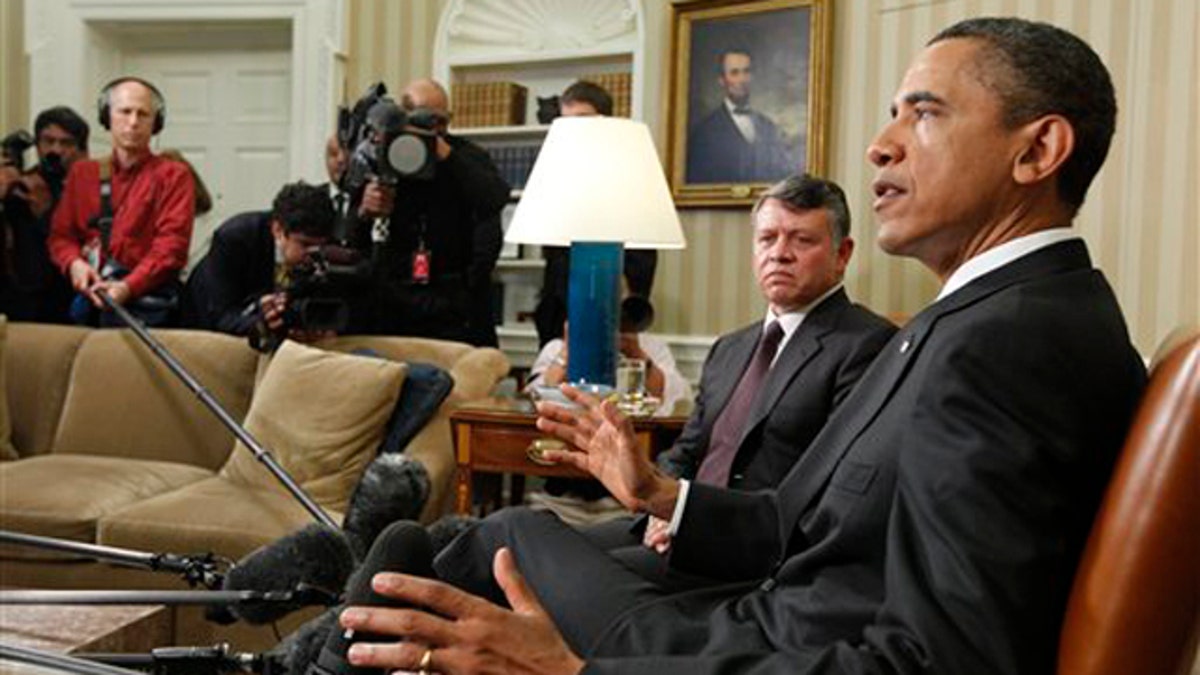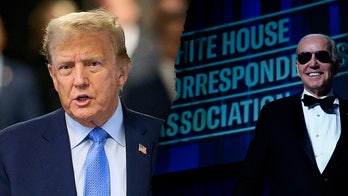
May 17: President Obama meets with Jordan's King Abdullah II in the Oval Office at the White House. (AP)
President Obama has a Gordian Knot to untie in the Mideast, as the "Arab spring" starts to get entangled with the stalled Israeli-Palestinian peace process. And with the president set to deliver a major speech Thursday on U.S. policy in the region, Syria is emerging as one of the central obstacles.
After popular uprisings overthrew regimes in Tunisia and Egypt, the Syrian government has used deadly force to quell demonstrations inside its borders. So far, the U.S. has shown no inclination to intervene militarily there, as it has to stop the advances of strongman Muammar al-Qaddafi in Libya.
But Syria pushed the envelope over the weekend, with reports showing that Palestinians living in Syria were bused to the border with Israel in the Golan Heights, where demonstrations and violence broke out.
Asked about the incident, White House Press Secretary Jay Carney accused the government of Syria's Bashar al-Assad of "inciting" the protests to distract attention from demonstrations in Syria -- a tactic he claimed would not work on the U.S.
Carney said Tuesday the U.S. was looking at additional measures to push Syria toward listening to its people.
"We are looking at ways to put pressure on the Syrian government ... to pressure it so it ceases the violence against its own people and engages its people in legitimate dialogue," Carney said.
But Carney said Thursday's speech will focus neither solely on Syria, nor on the Mideast peace process. He said the focus is a discussion on the "historic developments" of the last five or six months.
"I can say safely that the president will make news when he gives the speech Thursday," Carney said, declining to give specifics. "He will have some specific, new ideas about policy in the region."
The weekend protests, in which at least a dozen people were killed, sharpened international focus on the back-burnered peace process. But even before then, the president was preparing to try to revive the stalled talks.
Obama met Tuesday with Jordanian King Abdullah II, and afterward stressed the importance of a two-state solution between the Israelis and Palestinians. He delivers his Middle East speech Thursday at the State Department, ahead of a meeting Friday with Israeli Prime Minister Benjamin Netanyahu and a speech Sunday before the American Israel Public Affairs Committee, a pro-Israel group.
The pressure on diplomatic forces in the region to facilitate some semblance of a breakthrough is rising. Palestinians are seeking formal statehood recognition before the United Nations, which is set to decide in September. Hamas and Fatah also just struck a unity agreement. Both developments have raised concern among pro-Israel lawmakers on Capitol Hill who warn that Hamas, which controls Gaza, is not a legitimate partner for peace.
The Obama administration may be primed for a new approach after Middle East envoy George Mitchell informed the president he will resign effective Friday.
But if the weekend protests were a distraction, they might have also been a warning. Tony Badran, a fellow with the Foundation for Defense of Democracies, said the Syrians were sending a message straight to Israel with the weekend clashes.
"They brought (Palestinians) to the border with Israel in order to basically show Israel that this is what you can basically look forward to if something happens to the Syrian regime," he said.
Badran cited comments made by a Syrian insider to The New York Times. The individual, Rami Makhlouf, said, "If there is no stability here, there's no way there will be stability in Israel." Badran, on a conference call Monday, also suggested the Obama administration's policy so far of engagement with Syria is in serious jeopardy.
But the White House continues to express confidence that the uprisings in the Middle East and North Africa against entrenched regimes will yield a brighter future. Officials have cited the recent death of Al Qaeda leader Usama bin Laden as yet another step toward that goal.
Obama, after meeting with Jordan's king, described the changes in the Middle East as "extraordinary," while saying "it's more vital than ever" for Israelis and Palestinians to return to the negotiating table.
"The United States has an enormous stake in this," he said.
Carney said Obama is optimistic about the broader changes in the Middle East and stressed that the U.S. will continue to have an "unshakeable bond" with Israel throughout.
Lawmakers and others want to make sure that's the case. Sens. Ben Cardin, D-Md., and Susan Collins, R-Maine, just introduced a resolution opposing the Palestinian lobbying efforts at the United Nations for statehood.
Former Minnesota Gov. Tim Pawlenty, a likely presidential candidate, also urged Obama to "stand with Israel" and oppose the statehood vote.
"The United Nations has been-and continues to be-the single worst forum to resolve key issues between the Israelis and Palestinians. The Palestinians should be sitting down to negotiate peace with Israel, not creating a unity government with Hamas or grandstanding at the UN," he said.




